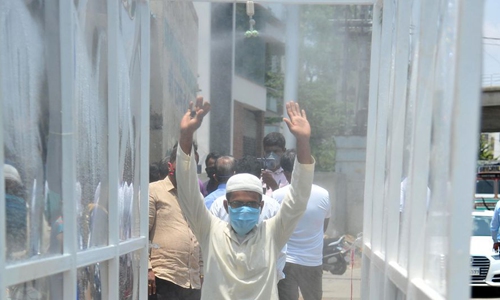India converts 5,000 train cars into isolation wards
Source:Global Times Published: 2020/4/12 20:23:40

A man walks through a disinfection tunnel at the entrance of a market in Bangalore, India, April 9, 2020. Photo:Xinhua
While convention centers, stadiums and arenas are converted into makeshift hospitals amid the global coronavirus pandemic, India is taking a different approach by transforming old train cars into isolation wards as the country experiences a shortage of hospital beds.
Medical experts said that the move fits India's situation and each country should develop its own version of "makeshift facilities" as it battles the coronavirus.
In an effort to halt the spread of the virus, the Ministry of Railways of India announced on April 6 that it had converted 2,500 train cars into isolation wards that can provide 40,000 beds for emergency use. The initial goal was to convert 5,000 coaches in two weeks.
According to photos released by the ministry, each car is equipped with simple facilities such as power supplies, oxygen cylinders, hooks, curtains and fans.
Prime Minister Narendra Modi imposed a nationwide lockdown on March 25, at which point Indian Railways suspended its passenger train services for the first time. The suspension was supposed to last until Tuesday this week.
Compared with Chinese solutions, including erecting field hospitals such as Huoshenshan and Leishenshan in Wuhan, Central China's Hubei Province, public opinion varies toward India's unique approach.
"It's in line with India's national conditions. The country doesn't have as many public buildings that can be transformed into makeshift hospitals as China. The most important thing is to meet its own conditions and effectively contain the spread," commented an internet user who has been to India, on China's Twitter-like Sina Weibo.
But others expressed concern over the health risks. "Is such confined small space suitable for rescue and isolation wards?" asked one.
For India, it's better than nothing, Zhou Zijun, a public health expert at Peking University, told the Global Times on Sunday.
"Foreign countries should adapt to local conditions and make the best use of their existing resources. It is not necessary that everyone copy the mode of China's makeshift hospitals," he said.
India was already suffering a shortage of hospital beds. According to Organisation for Economic Co-operation and Development, India has 0.5 hospital beds available for every 1,000 people, versus 13 in Japan and 12 in South Korea. India's facilities are mostly clustered in urban areas, with an uneven distribution across the country.
Under the premise of insufficient medical resources in India, turning rail cars into isolation wards can be an option, He Na, a professor at the School of Public Health, Fudan University, told the Global Times on Sunday.
"It is believed that the train cars are to be mainly used for mild cases. However, India should be aware of and prepared for high temperatures in non-air-conditioned train cars in the upcoming summer," he said.
As of press time, India had reported over 8,500 infections with 289 deaths, according to figures from CJohns Hopkins University.
Posted in: ECONOMY